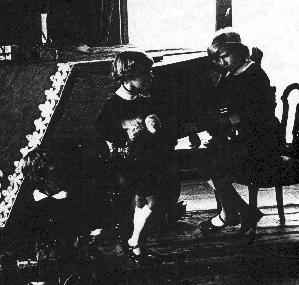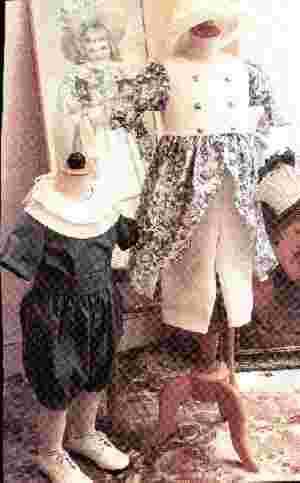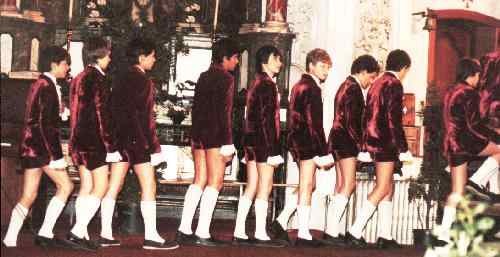
Modern Velvet Suits

Figure 1.--The velvet suits worn by boys for formal occasions since the 1940s were much more plain than the classic Fauntleroy suits. These brothers
in the 1970s wear identical short pants velvet suits with Peter Pan collars. They also wear white knee socks and strap shoes.
|
The Fauntleroy suits which first appeared in large numbers during
the 1880s lasted through the 1910s as one of the
major styles for boys' party suits. Less elaborate versions continued into
the 1920s, but then declined in popularity. Velvet suits were never more commonly worn by boys than during the late 19th Century when the Fauntleroy craze so influenced boys fashions.
Occassions
Velvet suits have not entirely disappear. Velvet suits have been worn by boys even in the modern era.
Weddings
Newspapers and magazines as late as the 1940s and 50s might describe a fancy boy's velvet suit for a wedding as a Fauntleroy suit. These suits might well have some lace and ruffles and would generally be short pants or knicker suits. Local newspapers often reported on such events in fashion colums and society weddings. An example is, "Bridesmaids were Miss Peggy Jean Frazee and Miss Zola Mae Schwarz, gowned alike in emerald green velvet with
headdress and flowers matching the matron of honor. Cherrie Marron, niece of the bride, was flower girl and Victor Ray Waters, cousin of the bride, was ring bearer. Cherrie's dress was emerald green made like the bridal gown. Victor Ray wore a Lord Fauntleroy suit. [November 15, 1949 OCEANSIDE BLADE TRIBUNE BEAUTIFUL OLD MISSION SAN LUIS REY SCENE OF IMPRESSIVE WEDDING RITES FOR ANNA E. MARRON, EARLY V. FRAZEE]
Holiday suits
They are especially popular wear during the Christmad holiday season. Little boys have worn one-piece outfits, oftem trimed in lace and ruffles like the Little Lord Fauntleroy suits of the late 19th Century.
Slightly older boys might wear a velvet Eton suit without the fancy trim worn by the younger boys, but often with a Peter Pan collar. Velvet suits have also been worn as costumes by boys' choirs and other special events. Velvet ring bearer and usher costumes are also worn byblittle boys partiipating in weddings.

Figure 2.--This French velvet suit with ruffled collar and knicker-style pants was made for a wedding. The caption reads, "No stylish Paris wedding is complete without junior attendants in ruffs and ruffles."
|
Little Boy Outfits
One-piece velvet out fits for little boys were made in a wide variety of styles these outfits were mostly for boys from 2-6 years, but primarily for boys before school age. These outfits almost always had short pants styling. Some were made
bloomer style. They often had lace or ruffled trim. In many cases they were made for special occasions, such as weddings or holiday season events.
These fancy dsuits have not disappeared, although in the 1990s they were worn by even younger boys. In addituion, the short pants styling has fiven way to knickers. Also satin suits have increased in popularity, tomsome extent replacing the velvet suits.
Eton Suits
Some American mothers continued to dress young boys in velvet suits for special pccadions even after reaching school age. The styles were much less elaborate than the little boy velvet suits. They were no longer worn with lace or ruffled
collars. Peter Pan collars without bows were
commonly worn. The jackets were worn like normal
suit jackets or the collarless Eton jackets. They were usually worn with
short pants, often with white knee socks. This style was geerally associated with wealthy familes. Boys from affluent families almost always were dressesd in
Eton suits.
The Eton velvet suit was not worn with
sausage curls, but it was also not commonly worn
with short hair styles. Commnly boys wore Eton suits with bangs or moderately
longer styles.
Velvet Eton suits were often worn for formal events such as the family Christmas or Ester portrait. Velvet suits were especially popular dress suits
for Christmas events.
They were often worn at formal weddings, usually by the ring bearer.
Dress suits
A younger boy's dress suit for special formal occasions was often a velvet suit. Black, forrest green, deep blue, and burgandy were common colors, but the black suits were the most common.
Holiday attire
The most common velvet suits were dress Eton suits for holiday occasions,
especially Christmas. These suits were worn with both Peter Pan and Eton collars.
Wedding attire
Eton suits were commonly used for boys attending weddings or participating in weddings and ushers or ring bearers. These suits were often not velvet, but velvet
was often used in formal weddings. Not all the suits were Eton suits, but that was the most popular style.

Figure 3.--This Bulgarian choir peformed in burgandy velvet suits with lace jabots and white kneesocks. Their traveling clothes, however, were mostly
jeans.
|
Choir Costumes
Some European boys' choirs have used velvet suits for performances. It was once considered very important for boys to dress formally for the performances with destinctive costumes. The number of such choirs has declined since the 1960s, however, as more and more choirs now perform in blazers and slacks rather than special performance costumes.
Modern velvet suits have been worn by boys who are still around to provide the details to HBC. These individuals remember the velvet suits they wore as a boy. The brief accounts here have been provided to HBC. Most of these suits were not as fancvy as the ones once worn and saddle shoes have generally replaced strap shoes.
Fauntleroy Related Pages:
[Return to theMain Fauntleroy page]
[Return to theMain velvet suit page]
[Classic period]
[Edwardian period]
[Fauntleroy dresses]
[Collars]
[Vivian Benett]
[Fauntleroy patterns]
Other Related Pages:
[Dresses]
[Kilts]
[Smocks]
[Pinafores]
[Sailor Hats]
[Blouses]
[Ring Bearers]
[Long hair]
[Sasuage curls]
[Hair bows]
[Bangs]
[Collars]
[Bows]
Navigate the Boys' Historical Clothing Web Site:
[Return to clothing styles]
[Introduction]
[Activities]
[Bibliographies]
[Biographies]
[Chronology]
[Contributions]
[Countries]
[Boys' Clothing Home]
Created: May 7, 1999
Last updated: October 6, 2000




